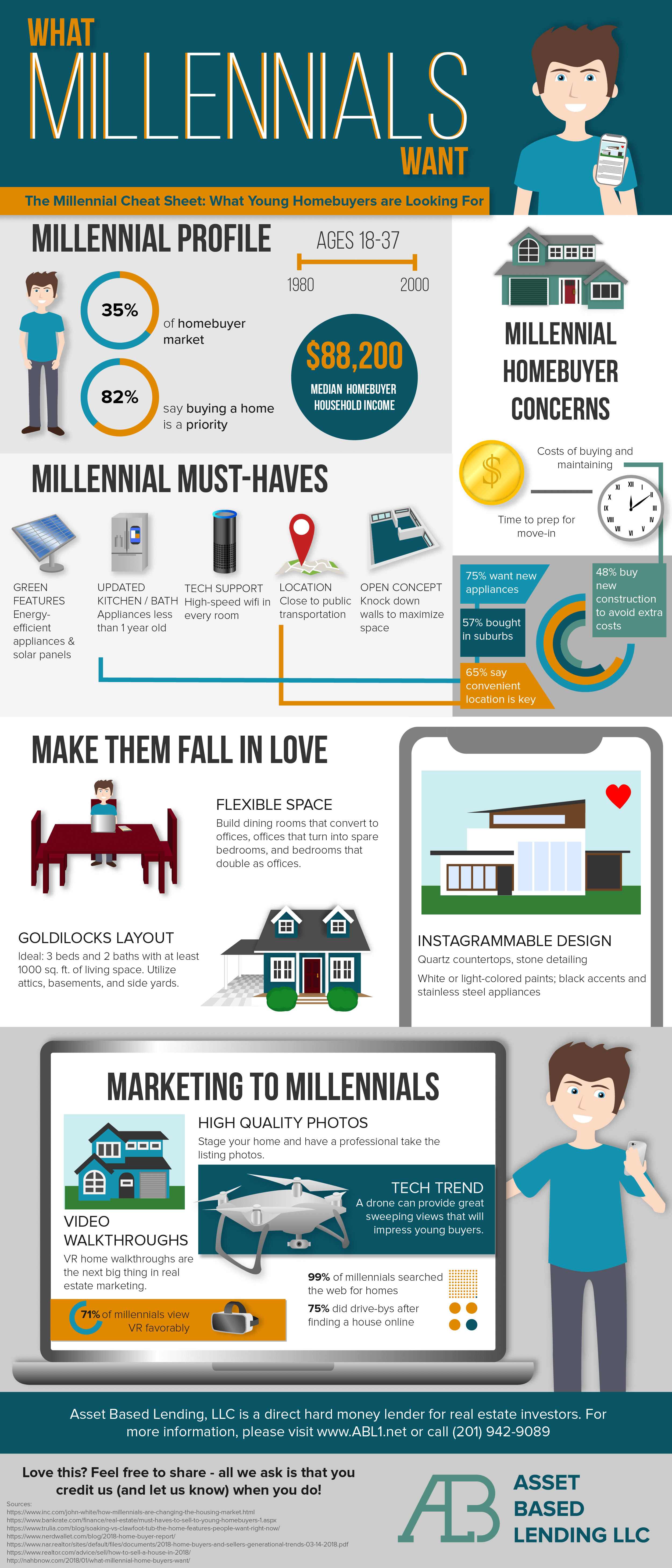It’s no secret that millennials are revolutionizing the real estate market. It can be challenging to figure out how to appeal to this current group of homebuyers, who are just starting to settle down. Their motivations, financial situations, needs, desires and ambitions differ from preceding generations. In order for real estate agents and firms to capture their interest, they must understand what young people are looking for in their journey to homeownership.
Defining a Millennial Homebuyer
Generation Y — more commonly referred to as “millennials” — is defined as the generation after the Baby Boomers and Generation X and made up of those born approximately between 1980 and 2000. There are a number of general and definable traits about this demographic that may play a role in their homebuying decisions.
For instance, millennials tend to be nostalgic, particularly for the 80s and 90s. However, they are more likely to embrace modern trends, technologies and lifestyles, especially when it comes to purchasing a house. Since this group makes up about 35% of the homebuyer market, it is increasingly imperative for sellers in the real estate space to know how to appeal to them.
Marketing a Home Begins Online
It’s important to understand the best ways to engage with the younger generation of homebuyers. This means technology, digital real estate marketplaces and social media are large parts of the process. Millennials will often begin their search online and do plenty of research about neighborhoods before setting foot in a house. This makes photos and video tours an essential first step in introducing potential buyers to a property and its key selling points.
Turn-Key Properties
Due to their limited budgets, millennials are looking for move-in ready spaces that require little to no extra work. Immediate usability is attractive primarily because it is faster and more affordable to maintain on the front end, which is why they tend to prefer new homes to older, pre-owned ones.
Older houses are often associated with substantial renovations, whether it’s cosmetic upgrades because of an outdated style or fixing a problem that the previous owners repaired incorrectly. However, young buyers place a strong emphasis on affordability, so these homes are not necessarily off the table, especially if the property fits their lifestyle and budget.
The Ideal Home
The function of a space is valuable to a homebuyer of any age. However, millennials tend to have their own preferences regarding the layout of a home. One of the most noticeable differences in current real estate trends is that a separate dining room is not a necessity. Instead, most young people prioritize a large kitchen with eat-in features and a “social flow” that blends into the family room area. Another crucial feature to consider is a large master bedroom that includes all the desirable amenities of a suite, such as a master bath and large walk-in closet.
A home office is also key to appealing to millennial buyers. Remote jobs and a work-from-home workstyle are becoming more and more popular every year, which makes a dedicated office space or small extra bedroom highly desirable. Lastly, smart technology is an increasingly popular amenity. This could include built-in speaker systems or smart home thermostats and outlets.
Thinking Green
As the generation at the forefront of fighting climate change, millennial homebuyers are attracted to eco-friendly solutions that help protect their conservative budgets and gratify their environmental consciousness. Features that are most appealing to Gen Yers include good insulation, newer windows, energy-efficient appliances and even solar panels. This green lifestyle also has an impact on location, as proximity to public transportation or a central, walkable downtown area is a huge plus.
A New Idea of Homeownership
In previous generations, buying a house meant a long-term investment and status symbol. It indicated that you were committing to a property that you would put your life, family and money into for 15-20 years. To millennials, however, homeownership is considered a rite of passage that signifies they have reached full and independent adulthood. With that autonomy, they tend to be less attached to one place, lowering their home lifespan to around 10 years. If a better job opportunity or life situation comes up, they are more open to relocation than their predecessors.
Millennials are also taking longer to buy property because they are waiting for financial stability, which is more difficult to come by with their amount of student debt and other challenges within the current post-college job market. Taking these factors into consideration, a seller must convince a young person that purchasing a certain home will fit his or her tight budget as well as their fluid and flexible lifestyle.
With a better understanding of the millennial generation comes the ability to recognize and seek out properties that best fit their needs and life choices. Contrary to popular belief, young people do want to buy homes. Adapting to their perception of homeownership will ultimately bring greater success in attracting their interest. For more tips on how to sell to Gen Yers, check out the accompanying infographic.

Infographic Source: https://www.abl1.net/blog/targeting-millennial-homebuyers/
Author bio:
Eric Krattenstein’s extensive marketing experience began at a boutique marketing agency where he developed dozens of successful innovative marketing strategies for brands ranging from startups to Fortune 500s. Prior to joining Asset Based Lending in 2016, Krattenstein served as U.S. Chief Marketing Officer for a European enterprise software company where he spearheaded the company’s expansion into the United States and Canadian markets. In his current role as Chief Marketing Officer, Krattenstein leads Asset Based Lending’s Sales and Marketing team that helps upward of 40 to 50 real estate investors close hard money loans each month.
